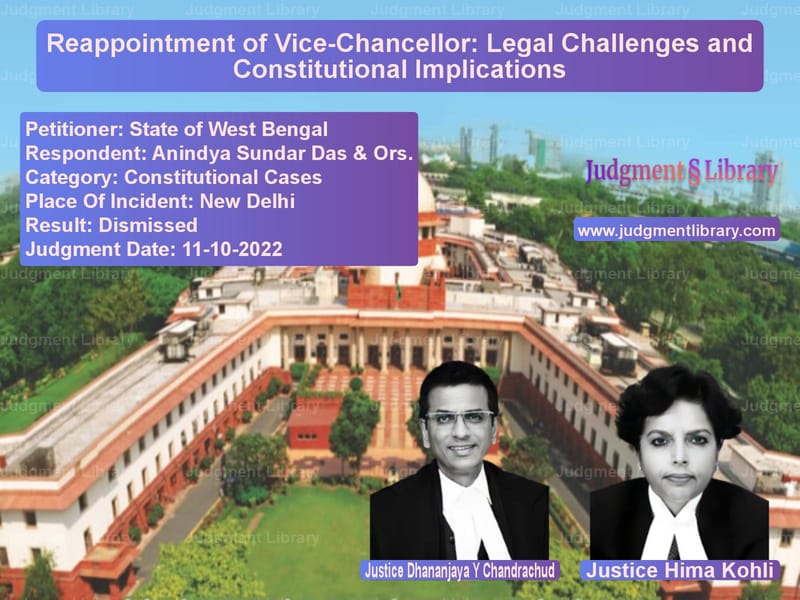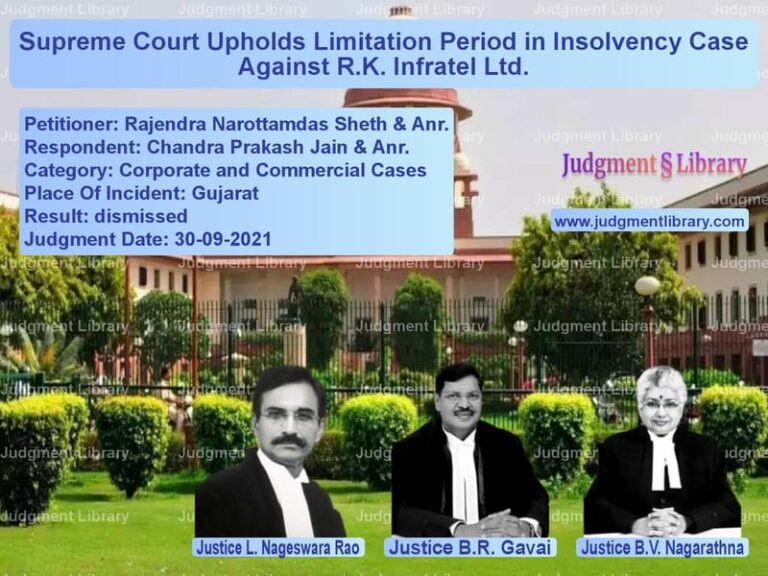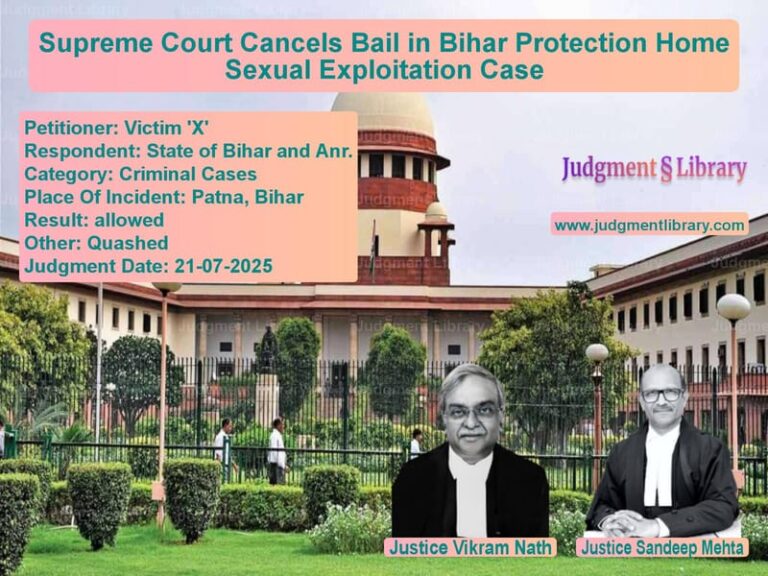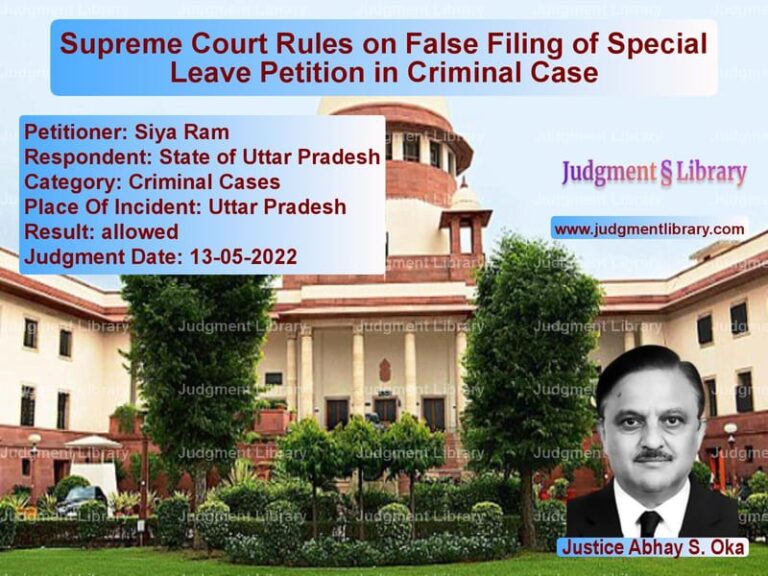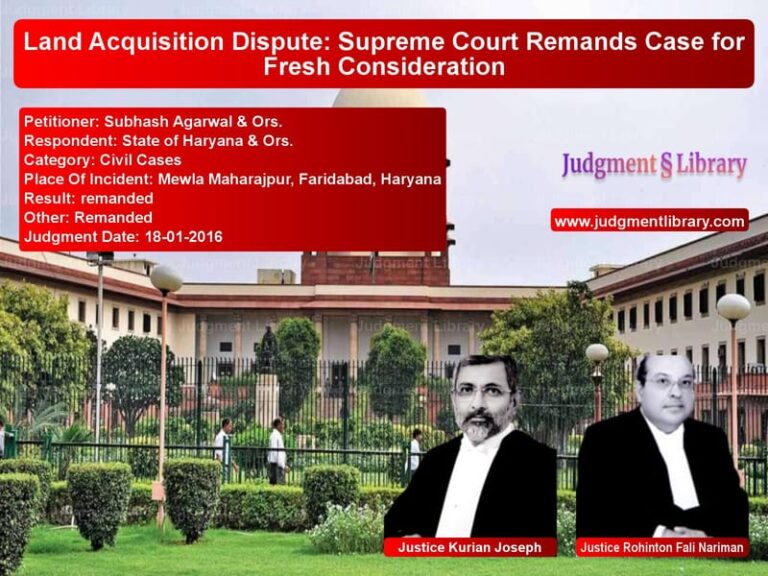Reappointment of Vice-Chancellor: Legal Challenges and Constitutional Implications
This case concerns the legal challenge against the reappointment of Professor Dr. Sonali Chakravarti Banerjee as the Vice-Chancellor (VC) of Calcutta University by the State government of West Bengal. The reappointment was challenged through a writ petition filed by an alumnus of the university, which led to a decision by the High Court of Calcutta that set aside the reappointment order. The key legal question revolves around the interpretation of the relevant provisions of the Calcutta University Act, 1979, and the constitutional validity of the State government’s actions in the reappointment process. The issue centers on whether the power to reappoint the VC rested with the Chancellor or the State government, and whether the procedure for reappointment was followed as per the Act and UGC Regulations.
Background:
The appellant, State of West Bengal, had reappointed Professor Dr. Sonali Chakravarti Banerjee as VC for a second term, which was opposed by the respondents. The reappointment was made after the first term of the VC ended in August 2021, but the procedure followed was contested on the grounds of non-compliance with statutory provisions and the failure to consult the Chancellor. The respondents argued that the reappointment could only be made by the Chancellor, not the State government, and that the procedure prescribed by Section 8 of the Calcutta University Act was not followed. The High Court ruled in favor of the respondents, declaring the reappointment order illegal, which led to the appeals filed by the State and the reappointed VC.
Appellant’s Arguments:
The appellant argued that Section 8(2)(a) of the Calcutta University Act, as amended in 2019, allowed for the reappointment of the VC by the State government, subject to the satisfaction of the State government regarding the VC’s academic and administrative record. The State government contended that the VC was eligible for reappointment without the need for a new search committee, as the Chancellor had no discretion once the State government’s satisfaction was met. The State government further argued that the Chancellor’s actions were limited to consultation and that the power to reappoint the VC rested with the State government under the amended provisions of the Act.
Respondent’s Arguments:
The respondents contended that the power to reappoint the VC rested with the Chancellor under Section 8(1) and that the Chancellor’s consent was required before any reappointment. They argued that the reappointment procedure followed by the State government was unconstitutional and violated the provisions of the Calcutta University Act, which expressly gave the Chancellor the authority to appoint or reappoint the VC. The respondents also relied on the University Grants Commission (UGC) Regulations, which stipulated that the VC must be appointed by the Chancellor and that the search committee process must be followed for reappointment.
The respondents pointed out that the power to reappoint the VC could not be exercised by the State government under Section 60, as this provision was only meant to address specific difficulties in implementing the statute, not to bypass the established process for reappointment.
Court’s Analysis:
The Supreme Court considered the legal provisions under the Calcutta University Act, the amendments made in 2019, and the relevant UGC Regulations. The Court noted that the original provisions of Section 8(2)(a) required the procedure for reappointment to follow the same process as initial appointments, which included the formation of a search committee. However, the 2019 amendments removed the requirement for a search committee for reappointment, indicating that the process for reappointment was simplified, but not that the power to reappoint was transferred from the Chancellor to the State government.
The Court observed that the language of Section 8(2)(a) did not explicitly remove the Chancellor’s power to make the reappointment. Instead, it allowed for reappointment based on the satisfaction of the State government, provided certain conditions were met. The Court found that the State government’s assertion that it had the sole power to reappoint the VC was inconsistent with the Act’s overall structure, which vested the final power of appointment, including reappointment, in the Chancellor.
Judgment:
The Supreme Court upheld the High Court’s decision, holding that the reappointment of the VC by the State government was unconstitutional. The Court ruled that the power to reappoint the VC rested with the Chancellor, and the State government’s action in bypassing this procedure was in violation of the Calcutta University Act. The Court clarified that while the State government could propose a reappointment, the final decision and appointment must come from the Chancellor, in line with the statutory provisions and UGC Regulations. The Court dismissed the appeals filed by the State government and the reappointed VC, affirming that the reappointment was invalid.
Conclusion:
This case highlights the delicate balance of power between the State government and the Chancellor in the appointment and reappointment of Vice-Chancellors at state universities. The Court’s decision reinforces the principle that statutory provisions and the constitutional framework must be followed to ensure the legitimacy of appointments in public offices. The judgment also clarifies the interpretation of reappointment procedures and emphasizes the role of the Chancellor in university governance, ensuring that the academic and administrative success of the incumbent VC is assessed in accordance with the law and regulations.
Petitioner Name: State of West Bengal.Respondent Name: Anindya Sundar Das & Ors..Judgment By: Justice Dhananjaya Y Chandrachud, Justice Hima Kohli.Place Of Incident: New Delhi.Judgment Date: 11-10-2022.
Don’t miss out on the full details! Download the complete judgment in PDF format below and gain valuable insights instantly!
Download Judgment: state-of-west-bengal-vs-anindya-sundar-das-&-supreme-court-of-india-judgment-dated-11-10-2022.pdf
Directly Download Judgment: Directly download this Judgment
See all petitions in Constitution Interpretation
See all petitions in Separation of Powers
See all petitions in Fundamental Rights
See all petitions in Judgment by Dhananjaya Y Chandrachud
See all petitions in Judgment by Hima Kohli
See all petitions in dismissed
See all petitions in supreme court of India judgments October 2022
See all petitions in 2022 judgments
See all posts in Constitutional Cases Category
See all allowed petitions in Constitutional Cases Category
See all Dismissed petitions in Constitutional Cases Category
See all partially allowed petitions in Constitutional Cases Category

